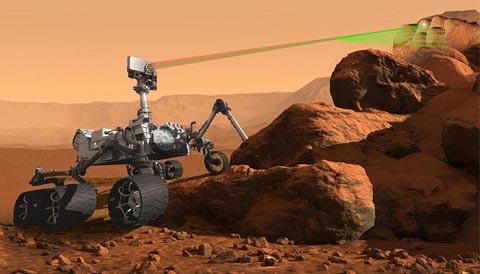NASA 'Mars' helicopter model is almost ready for the journey to conquer Red Planet
Mars Helicopter - The unmanned helicopter model intended to be used in research missions as well as exploring NASA's Mars surface recently completed another important test round and is expected to be completed soon. to integrate on Mars 2020 exploration robot (will also be officially released this summer). Letting a machine take off on Mars on a planet is a particularly difficult task, which lies in the fact that Mars's air layer is much thinner than Earth.

- NASA: 5G makes the ability to forecast weather 2 days later
Earlier, earlier this year, JPL also conducted a test of unmanned helicopters in a simulated area like the Mars environment. In particular, the aircraft must operate in extremely harsh conditions, with temperatures down to -54 degrees Celsius and especially flying in vacuum chambers simulated in accordance with the air characteristics of Mars, besides , gravity on this planet has also been perfectly simulated. The reason for such complicated and costly tests is to ensure that Mars Helicopter can survive and operate satisfactorily in the environmental conditions that it will have to go through in a rocket launch. real real.

- Admire 10 priceless photos taken by NASA's Spitzer telescope
Mars Helicopter has now been brought back to JPL's lab. Here, scientists will add a new solar cell to the aircraft, which helps it maintain its operation with a strong enough energy source. NASA said it did not place any other scientific instruments on the helicopter in addition to dedicated camera clusters and a nuclear power generator to determine whether the Mars environment whether it is appropriate for the next discovery missions. Instead, however, scientists will have to resort to other extremely complex machines to control Mars Helicopter operations from Earth in the most efficient way, especially to ensure accuracy. as well as the stability of signals connected between helicopters on Mars and the control center operating on Earth.
- Please watch the first 8K video filmed in space
Mars 2020 is the latest mission in NASA's Mars Exploration Program with the main purpose of visiting areas of possible life, collecting and analyzing soil and rock samples to find fertility characteristics. study, chemistry. Some of these samples will be stored for recovery and brought to Earth for future missions. As planned, Mars 2020 rocket will be launched into space in July 2020 and is expected to arrive on Mars on February 18, 2021.

- NASA launched the application to help users take selfie photos in space, invite experience
A rather interesting information on the sidelines. NASA will allow people to send information about their names to engrave on silicon chips that will be placed on board. The main destination of the mission will be the Jezero Crater, where NASA hopes these state-of-the-art space exploration machines can find signs of ancient life.
You should read it
- ★ How does human body change in Mars?
- ★ Why are microorganisms living 'so tough' on Earth but still hard to survive on Mars
- ★ NASA began assembling Mars 2020 spacecraft
- ★ The strangest objects ever taken on Mars surprised many
- ★ NASA reveals its latest snapshot of the Martian surface with a resolution of 1.8 billion pixels